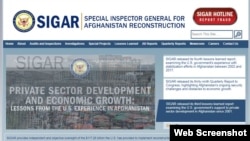Anti-corruption efforts in Afghanistan continue to face challenges of capacity, resources, lack of action against powerful individuals, and the presence of "unqualified and potentially corrupt actors" in key government institutions combating corruption.
Those findings are part of a report conducted by the U.S. Special Inspector General for Afghanistan Reconstruction (SIGAR) on the policy and corruption reform undertaken by the Afghan government.
In the report, released Wednesday, SIGAR praised Afghan officials' efforts to implement the anti-corruption strategy, but noted areas that did not meet "some international standards and best practices."
The report questioned the ability of the Afghan government to fully implement the strategy and demonstrate a lasting commitment to combating corruption.
SIGAR noted that the strategy focuses on 15 "priority" ministries but leaves the role of Afghanistan's Defense Ministry, the largest portfolio, unclear.
"If the Afghan government continues not to take action against public officials who violate internal codes of ethics, while simultaneously failing to protect reformers and whistle-blowers from reprisal, a climate of corruption will endure," the report said.
Lax investigation, prosecution
Afghanistan's law enforcement and judiciary often avoid investigating, prosecuting and punishing powerful individuals.
Moreover, U.S., international and Afghan officials have all expressed skepticism about the Afghan parliament's willingness to support anti-corruption reforms.
SIGAR has been tasked to identify fraud and recommend steps to prevent it. The agency submits reports to the U.S. Congress quarterly, detailing audits of reconstruction- and security-related programs that are funded by U.S. taxpayers to stabilize Afghanistan.
Afghan officials were not available immediately to comment on SIGAR's findings.
The United States has spent about $1 trillion to secure and stabilize Afghanistan. Most of the funds have been devoted to creating and training the Afghan National Defense and Security Forces so they can tackle the Taliban-led insurgency.




